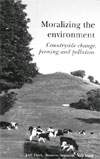The polluting reaper
 the book explains how farming, in its modern avatar, has acquired the dubious distinction of becoming a major polluter from its benign position of an activity in harmony with nature. The book describes how this scenario has changed.
the book explains how farming, in its modern avatar, has acquired the dubious distinction of becoming a major polluter from its benign position of an activity in harmony with nature. The book describes how this scenario has changed.
Agriculture, which was once bereft of pollution, is now an environmental risk. The book is based on a study on farm pollution in the uk . The authors analyse how effluents from farms are now considered a major polluter. This is more as a result of wrong practices rather than an inevitable by-product of agricultural activities. Farmers once respected custodians of nature, today, stand guilty of desecrating it.
The shift in farming technology after the World War ii , when farming changed to the high input-high output mode, resulted in an increase in farm pollution. The number of reported polluting incidents in England and Wales, more than doubled from about 1,500 in 1979 to over 3,000 by the late 1980s. In 1990, more than a third of all major polluting incidents were from farms, leading to agriculture being called as "the single most damaging activity in relation to water quality'.
The authors analyse the changes in dairy farming. In order to achieve economies of scale, farmers began concentrating their resources land, labour and capital on the production of a small range of commodities. Mixed livestock farming and cropping systems gave way to large dairy herds translating into large volumes of potent liquid effluents instead of the solid manure that was used on fields.
Throughout the 1970s and early 1980s, agricultural pollution was largely unknown. The book describes the reasons behind the change in farm pollution status from being treated indulgently as a non issue to an emerging problem.
The book deals with the politicisation of farm pollution. In 1983, the uk department of environment declared that the main problem of farm pollution was due to the odour of the waste from intensive poultry and pig farming. Five years later the department changed its stance and accepted that wastes from farms were a major source of water pollution and which needed regulation. The was due to the hue and cry created by the privatisation of water resources by the Thatcher government. Water privatisation shook the faith of the common person in the government, proving to be perhaps the most controversial of privatisations. It offered scope to regulatory officials and pressure groups a chance to promote a new environment morality. The result was that agriculture passed from being one of the least to one of the most formally regulated sectors from the point of view of pollution control, involving a new regulatory regime, novel instruments, new and reorganised agencies and reshaped policy agencies.
Chapter five of the book describes the Pollution Inspector's account of farm pollution while the next chapter gives an insight into the dairy farmers' account of the same. Armed with a new set of legal powers, the inspector had to closely interact with the farmers, educate them and offer them solutions on how best to tackle pollution problems. Farmers saw this as an opportunity to make the inspectors aware of their problems and constraints and the unfairness of the recently introduced regulations.
At this point the environment and agricultural activists stepped in. The former, extremely intolerant of farm waste pollution, viewed it as the outcome of agricultural recklessness and the press went to town, describing farm pollution as an
